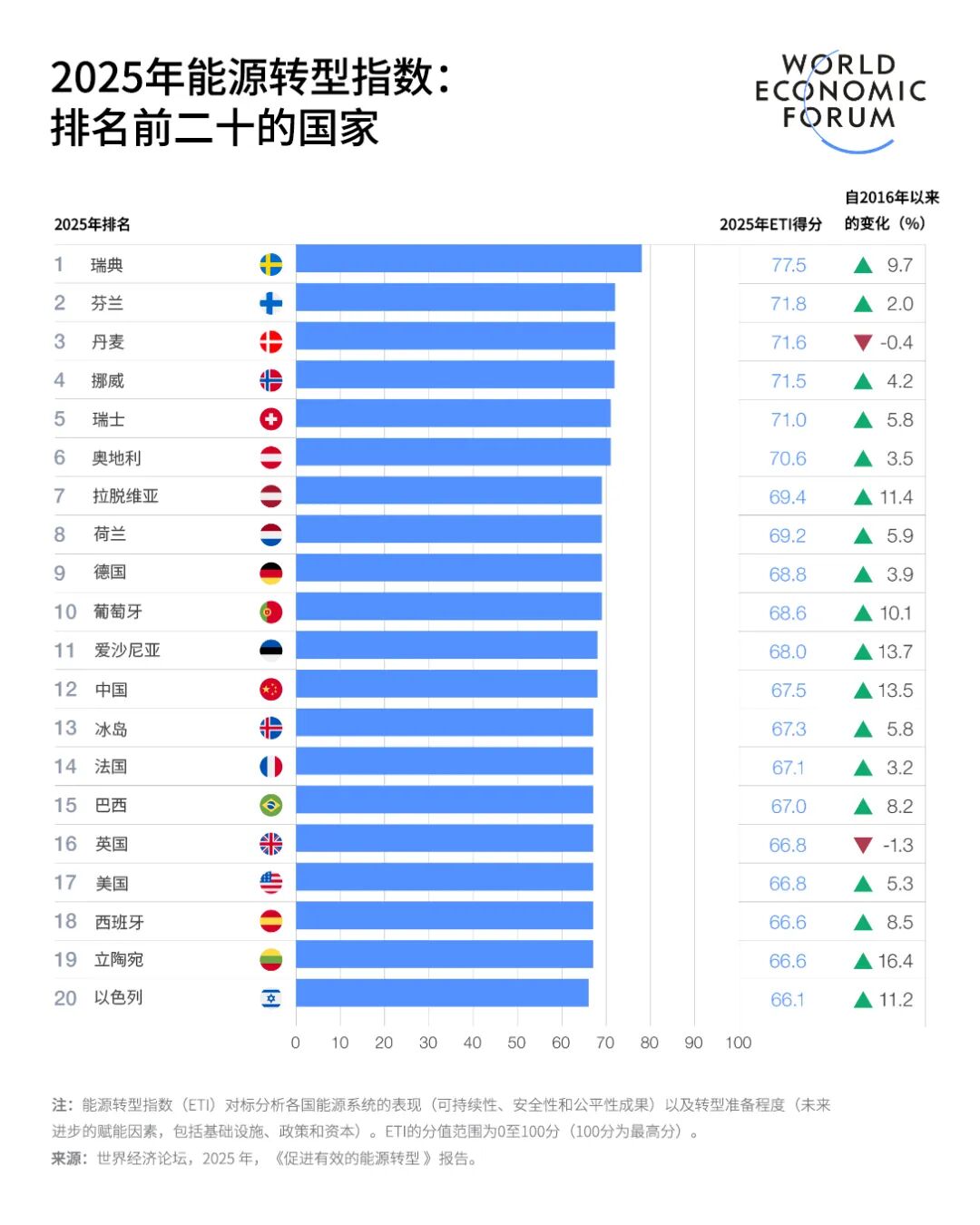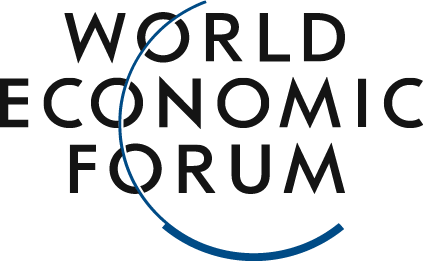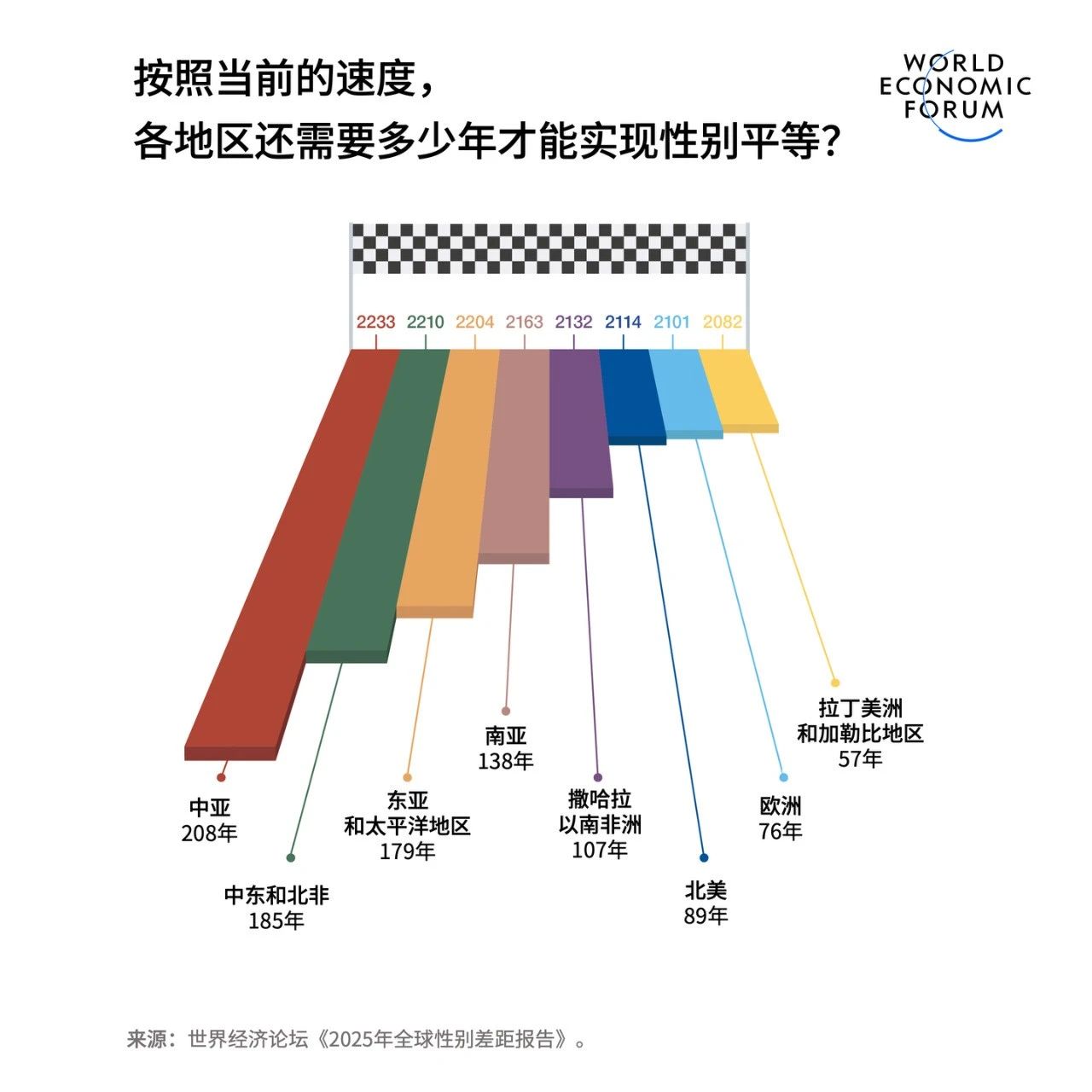The World Economic Forum's 2025 Energy Transition Index reveals that the global energy transition is accelerating at its fastest pace since pre-pandemic levels, with 65% of countries improving their scores. Additionally, 28% of nations have made progress across all core dimensions—security, environmental sustainability, and equity.
Sweden, Finland, Denmark, Norway, and Switzerland lead the index rankings, thanks primarily to their unwavering policy commitments, robust infrastructure, and diversified clean energy sources.
Emerging economies in Europe saw the largest gains, while those in Asia outperformed the global average.
Despite clean energy investments reaching $2 trillion in 2024, energy security has not improved, and emissions have hit yet another all-time high, underscoring the urgent need to build resilient power grids, develop digital infrastructure, and make targeted capital investments.
To read the full report, please click "Read More" at the end of the article.
According to a report released today by the World Economic Forum, after years of sluggish progress, the global energy system is accelerating its transformation across key dimensions such as security, equity, and environmental sustainability. Yet at the same time, escalating geopolitical conflicts, insufficient energy investments, and the growing disconnect between clean-energy innovation and deployment could potentially undermine the positive momentum of the global energy transition.
The 2025 "Driving Effective Energy Transitions" report, jointly released by the World Economic Forum and Accenture, benchmarks the performance of energy systems across 118 countries along three key dimensions and five readiness factors. The three dimensions are security, environmental sustainability, and equity, while the five readiness factors include political commitment, finance and investment, innovation, infrastructure, and education & human capital. In 2025, 65% of countries improved their Energy Transition Index scores, with 28% achieving progress across all three core dimensions.
While advanced economies are working hard to tackle challenges such as grid congestion, soaring prices, and transmission bottlenecks, emerging economies in Europe and Asia have made progress in their energy transitions by implementing targeted reforms, upgrading infrastructure, and ramping up investments in clean energy.
"Energy systems around the world are evolving at different paces," says Roberto Bocca, Managing Director of the Energy and Materials Center at the World Economic Forum. "We’re witnessing more comprehensive initiatives and clear progress across the board. Encouragingly, 28% of countries—including major energy consumers and producers like Brazil, China, the United States, and Nigeria—are making strides in multiple dimensions. Of course, rapidly growing emerging economies urgently need to ramp up investment efforts to sustain the momentum of their energy transitions."
In 2025, the Energy Transition Index score increased by 1.1% year-on-year, marking the fastest progress since before the COVID-19 pandemic. Notably, the fairness dimension saw the most significant improvement, driven by stable energy prices and the gradual reduction of energy subsidies. Meanwhile, the environmental sustainability score also rose, thanks to higher adoption rates of renewable energy and enhanced energy efficiency. However, the energy security dimension remained stagnant, primarily due to an inflexible power system, continued reliance on imports, and limited diversification. In 2024, clean energy investments reached a staggering $2 trillion—but ironically, this record-breaking year for global temperatures also witnessed emissions hitting an all-time high of 37.8 billion tons. This surge in emissions was largely fueled by rising energy demand, which grew by 2.2% as industries like artificial intelligence, data centers, cooling systems, and electrification continued to expand.
“Artificial intelligence is the most transformative technology of our time—and the single greatest enabler shaping a smarter, more adaptive, and resilient energy future,” said Muqsit Ashraf, Global Head of Strategy at Accenture. “Leading companies are leveraging technology, data, and AI to accelerate business transformation, placing people at the heart of change and ultimately driving growth that’s both more resilient and sustainably profitable over the long term.”
2025 Energy Transition Index Scores
Sweden, Finland, and Denmark rank among the top three on the Energy Transition Index, highlighting their long-term policy commitments, robust infrastructure, and diversified, low-carbon energy systems. Norway and Switzerland also make the top five, underscoring the renewed momentum they’ve gained in advancing their energy transitions. Austria, Latvia, and the Netherlands follow closely behind, excelling particularly in areas like equity, clean-energy capital investment, and renewable energy capacity expansion. Germany and Portugal round out the top ten on the index.
Among the top 20 economies, China has outperformed its previous rankings, climbing to 12th place—thanks largely to its scale and leadership in innovation and clean-energy investments. Brazil, meanwhile, ranks 15th by boosting energy diversification, lowering energy prices, and increasing the share of clean energy in its mix, making it the highest-ranked economy in Latin America. The UK comes in at 16th, while the U.S., bolstered by its diversified energy system and robust innovation capabilities, moves up to 17th overall—and claims the top spot in the Energy Security dimension.
India has made progress in energy efficiency and investment capacity, while the UAE has achieved its largest annual increase in a decade—driven by rapid infrastructure upgrades, targeted subsidy reforms, a growing share of clean energy adoption, and a significant reduction in energy intensity.

The report highlights three key systemic priorities for advancing the energy transition: redefining energy security beyond traditional energy supplies by incorporating grid resilience and digital infrastructure into the broader concept of energy safety; addressing capital imbalances, particularly in emerging economies; and breaking through infrastructure bottlenecks—issues like delayed approvals, labor shortages, and inadequate grid capacity—that currently pose significant barriers to the energy transition (and which, compared to technological availability, are proving even more restrictive).
To maintain momentum for the transition and enhance the resilience of the energy system, the report calls for adopting adaptive policies that attract long-term investments and foster collaboration among all stakeholders; building modernized infrastructure; investing in workforce skill development and innovation—particularly in hard-to-abate sectors—while scaling up the deployment of clean technologies; and increasing capital investment in developing economies.
Since 2021, more than 80% of the growth in energy demand has come from emerging and developing economies, yet over 90% of clean energy investments have been made in developed economies and China—highlighting a disconnect between capital flows and future demand.
Emerging economies in Europe have made the most significant progress, particularly excelling in infrastructure—where scores improved by 8.3%—and energy equity, which saw a notable boost of 5.8%. Among them, Latvia achieved the highest score, while Bosnia and Herzegovina recorded the fastest improvement. In Asia’s emerging economies, China remains at the forefront, closely followed by Malaysia. These economies have also enhanced their regulatory environments, with scores rising by 2.6%, and ramped up investments in clean energy, increasing by an impressive 18.7%.
Sub-Saharan Africa has also made progress in its energy transition, driven by stronger political commitments and more robust capital flows. Notably, Nigeria has seen particularly impressive gains, climbing from 109th place in 2016 to 61st in 2025. This upward trajectory highlights how targeted reform measures and locally tailored transformation strategies are delivering better results across diverse market conditions.
As energy systems continue to evolve amid climate pressures, geopolitical conflicts, and economic fragmentation, the Energy Transition Index underscores the critical importance of tailoring strategies to local contexts. To sustain progress in the energy transition, economies must further enhance their resilience and adaptability, while also strengthening regional and global collaboration.

Feel free to share this in your WeChat Moments; please leave a comment at the end of the post or on our official account if you’d like to republish.
The World Economic Forum is an independent and neutral platform dedicated to bringing together diverse perspectives to discuss critical global, regional, and industry-specific issues.
Follow us on Weibo, WeChat Video Accounts, Douyin, and Xiaohongshu!
"World Economic Forum"


